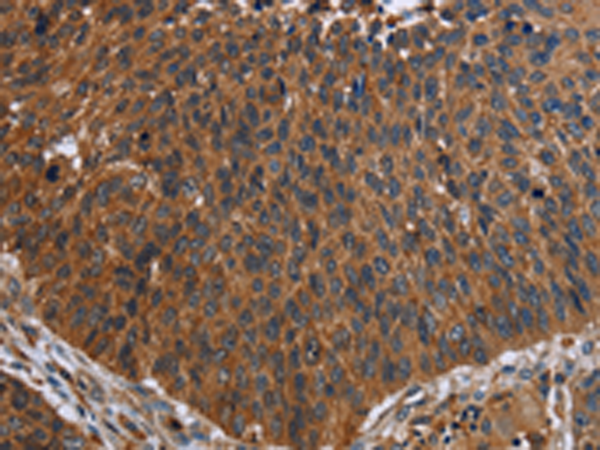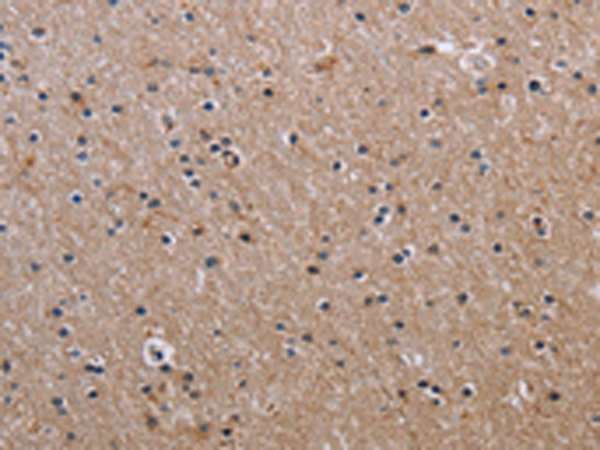

| WB | 咨询技术 | Human,Mouse,Rat |
| IF | 咨询技术 | Human,Mouse,Rat |
| IHC | 1/50-1/200 | Human,Mouse,Rat |
| ICC | 技术咨询 | Human,Mouse,Rat |
| FCM | 咨询技术 | Human,Mouse,Rat |
| Elisa | 1/2000-1/5000 | Human,Mouse,Rat |
| Aliases | CD16; FCG3; CD16A; FCGR3; IGFR3; IMD20; FCR-10; FCRIII; FCGRIII; FCRIIIA |
| Host/Isotype | Rabbit IgG |
| Antibody Type | Primary antibody |
| Storage | Store at 4°C short term. Aliquot and store at -20°C long term. Avoid freeze/thaw cycles. |
| Species Reactivity | Human |
| Immunogen | Fusion protein of human FCGR3A |
| Formulation | Purified antibody in PBS with 0.05% sodium azide and 50% glycerol. |
+ +
以下是关于 **FCGR3A抗体** 的3篇代表性文献及其摘要:
---
1. **文献名称**: *Therapeutic activity of humanized anti-CD20 monoclonal antibody and polymorphism in IgG Fc receptor FcγRIIIa gene*
**作者**: Cartron, G., et al.
**摘要**: 该研究探讨了FCGR3A基因多态性(158V/F)对非霍奇金淋巴瘤患者接受利妥昔单抗(抗CD20单抗)治疗疗效的影响,发现携带158V等位基因的患者因受体亲和力增强,临床缓解率更高。
2. **文献名称**: *FcγRIIIa-158V/F polymorphism influences the binding of IgG by natural killer cell FcγRIIIa, independently of the FcγRIIIa-48L/R/H phenotype*
**作者**: Koene, H.R., et al.
**摘要**: 文章分析了FCGR3A基因多态性(158V/F和48L/R/H)对NK细胞受体与IgG结合能力的影响,表明158V变异可独立增强抗体依赖性细胞毒性(ADCC),为优化抗体药物设计提供依据。
3. **文献名称**: *Clinical relevance of FCGR3A gene polymorphisms in chronic lymphocytic leukemia*
**作者**: Weng, W.K., Levy, R.
**摘要**: 研究显示,慢性淋巴细胞白血病(CLL)患者的FCGR3A-158V/F多态性与利妥昔单抗疗效相关,158V纯合子患者的总生存期显著延长,提示基因分型可指导个体化治疗。
---
这些文献涵盖了FCGR3A抗体在肿瘤治疗中的机制、基因多态性对疗效的影响,以及相关临床应用的探索。如需更多领域(如自身免疫病)的文献,可进一步补充。
FCGR3A (Fc gamma receptor IIIa), also known as CD16a, is a cell-surface glycoprotein belonging to the immunoglobulin superfamily. It is primarily expressed on natural killer (NK) cells, macrophages, and dendritic cells. As a low-affinity receptor for the Fc region of IgG antibodies, FCGR3A plays a critical role in antibody-dependent cellular cytotoxicity (ADCC), a mechanism by which immune cells recognize and eliminate antibody-coated pathogens or malignant cells. This receptor binds to immune complexes, triggering intracellular signaling pathways that activate cytotoxic responses, cytokine release, and phagocytosis.
Antibodies targeting FCGR3A are widely used in research and therapeutics. In clinical settings, therapeutic monoclonal antibodies (e.g., rituximab, trastuzumab) rely on FCGR3A engagement to enhance effector cell activity against cancer cells. Conversely, anti-FCGR3A antibodies can also block receptor function to modulate immune responses in autoimmune diseases. Genetic polymorphisms in FCGR3A, particularly the F158V variant, influence receptor affinity for IgG and correlate with differential clinical outcomes in antibody-based therapies.
Research on FCGR3A antibodies continues to advance personalized medicine, particularly in oncology and immunotherapy. Their dual role as therapeutic agents and experimental tools underscores their importance in understanding immune regulation and optimizing treatments for diseases like cancer, infections, and autoimmune disorders.
×